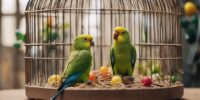Why Pellet Quality Matters in Your Chinchilla's Diet

Pellet quality plays a crucial role in maintaining your chinchilla's health. High-quality pellets provide essential nutrients and vitamins necessary for their well-being. When choosing pellets for your chinchilla, opt for those specifically formulated for their dietary needs. These pellets should be free from added sugars, artificial colors, and fillers to ensure a balanced diet. Regularly check the expiration date on the pellet packaging to guarantee freshness and potency. Remember, the quality of your chinchilla's pellets directly impacts their overall health and longevity.
Chinchillas are strict herbivores and rely heavily on their diet to meet their nutritional requirements. Inadequate pellet quality can lead to nutritional deficiencies and health issues such as dental problems, obesity, and digestive disorders. Therefore, investing in high-quality pellets is a vital aspect of caring for your chinchilla's health. Additionally, always provide fresh hay and clean water alongside the pellets to create a well-rounded diet for your furry friend. By prioritizing pellet quality, you can ensure that your chinchilla remains healthy and happy for years to come.
Nutritional Requirements of Chinchillas
Understanding the nutritional requirements of chinchillas is essential for their overall health and well-being. When it comes to protein needs, chinchillas require a diet that's rich in high-quality proteins to support their growth, maintenance, and overall health. Protein is necessary for muscle development and proper functioning of various physiological processes in chinchillas. Ensuring that your chinchilla's diet meets its protein requirements is important to prevent deficiencies and promote excellent health.
In addition to protein, chinchillas also require a balanced intake of calcium to support their bone health and prevent issues like dental problems and metabolic imbalances. Calcium balance is vital for chinchillas as they're prone to developing issues related to calcium deficiency or excess. Providing a diet that contains the right amount of calcium is crucial for maintaining your chinchilla's overall health and well-being. By understanding and meeting their protein and calcium needs, you can help your chinchilla thrive and lead a healthy life.
Impact of Low-Quality Pellets
Choosing high-quality pellets for your chinchilla's diet is essential to avoid negative impacts on their health and well-being. Low-quality pellets can lead to significant health consequences for your furry friend. These pellets often lack the necessary nutrients and fiber, which can result in digestive issues such as diarrhea or constipation. Inadequate nutrition can also affect your chinchilla's weight management, leading to obesity or malnourishment.
Additionally, dental health is another critical aspect affected by low-quality pellets. Chinchillas have continuously growing teeth that require proper wear down to prevent overgrowth. Low-quality pellets may not provide the right texture or hardness necessary for maintaining dental health, potentially leading to dental problems like uneven wear, malocclusion, or tooth spurs.
Benefits of High-Quality Pellets

Selecting high-quality pellets for your chinchilla's diet is vital for their overall health.
These pellets offer essential nutrients that your pet requires to thrive, guaranteeing they receive the proper nutritional value.
Moreover, high-quality pellets are easily digestible for chinchillas, preventing problems like selective feeding and promoting balanced nutrition.
Nutritional Value Importance
Quality pellets for your chinchilla's diet are essential due to the significant benefits they provide regarding nutritional value. High-quality pellets offer ideal protein sources and ideal fiber content important for your chinchilla's health.
These pellets are formulated to provide the right balance of vitamins and minerals necessary for your pet's well-being. Protein sources in premium pellets help in muscle development, while fiber aids in digestion and prevents gastrointestinal issues.
The vitamin levels and mineral balance in quality pellets make certain that your chinchilla receives the essential nutrients required for overall vitality. By choosing premium pellets, you're prioritizing your chinchilla's nutrition, promoting a healthy and happy life for your furry friend.
Digestibility for Chinchillas
To optimize your chinchilla's digestive health and ensure proper nutrient absorption, the digestibility of high-quality pellets plays an important role. When considering chinchilla health, digestibility testing is vital for evaluating how well your pet can break down and utilize nutrients from the food consumed.
High-quality pellets often use premium fiber sources that aid in digestion efficiency, promoting a healthy gastrointestinal system for your furry friend. This helps prevent digestive issues and ensures your chinchilla receives the necessary nutrients for overall well-being. By choosing pellets with excellent digestibility, you can support your chinchilla's health and maintain their vitality.
- Digestibility Testing: Evaluates nutrient breakdown.
- Chinchilla Health: Promotes overall well-being.
- Fiber Sources: Premium ingredients aid digestion.
- Digestion Efficiency: Ensures proper nutrient absorption.
Prevents Selective Feeding
Preventing selective feeding is a key advantage of opting for high-quality pellets in your chinchilla's diet. When you choose premium pellets, you guarantee that your chinchilla consumes a balanced diet, preventing malnutrition and promoting overall health. Selective feeding, where chinchillas pick out only certain seeds or pieces from their food mix, can lead to nutritional imbalances. High-quality pellets are specially formulated to provide all the essential nutrients your chinchilla needs in every bite, discouraging selective eating habits. By offering your chinchilla high-quality pellets, you actively contribute to its well-being by ensuring it receives a complete and balanced diet. Check out the table below highlighting the benefits of high-quality pellets:
| Benefits of High-Quality Pellets | Description | Impact |
|---|---|---|
| Prevents Selective Feeding | Discourages picking out only certain seeds | Promotes balanced diet |
| Ensures Complete Nutrition | Provides all essential nutrients in every bite | Prevents malnutrition |
| Supports Overall Health | Contributes to chinchilla's well-being | Promotes vitality and longevity |
Choose quality for your chinchilla's diet, and watch it thrive!
Choosing the Right Pellet Brand

Selecting the appropriate pellet brand for your chinchilla can greatly impact their overall health and well-being. When choosing the right pellet brand, consider the following:
- Brand comparison, cost analysis: Conduct thorough research on different brands available in the market. Compare the ingredients, nutritional value, and pricing to guarantee you're providing the best for your chinchilla.
- Online reviews, user feedback: Look for online reviews and user feedback on various pellet brands. Real experiences from other chinchilla owners can offer valuable insights into the quality and effectiveness of different brands.
- Ingredient quality: Prioritize pellet brands that use high-quality ingredients without fillers or artificial additives. Your chinchilla's diet should consist of nutritious pellets to support their health.
- Veterinarian recommendations: Consult with your veterinarian to get recommendations on reputable pellet brands. They can provide guidance based on your chinchilla's specific dietary needs and health requirements.
Importance of Fiber Content
When considering the nutritional needs of your chinchilla, the fiber content in their pellet diet plays a significant role in maintaining their digestive health. Fiber is essential for chinchillas as it aids in digestion, promoting regular bowel movements and preventing gastrointestinal issues. High-fiber pellets help regulate the digestive system, reducing the risk of bloating and other stomach problems commonly seen in chinchillas.
Fiber digestion in chinchillas is critical for nutrient absorption. The presence of adequate fiber guarantees that food moves smoothly through the digestive tract, allowing for best absorption of essential nutrients. Without enough fiber in their diet, chinchillas may struggle to absorb key vitamins and minerals necessary for their overall health and well-being.
Pellet Ingredients to Avoid

To guarantee your chinchilla's peak health, be cautious of certain pellet ingredients that should be avoided. Ensuring the nutritional balance of your pet's diet is paramount. Here are some key ingredients to steer clear of:
- Avoiding fillers: Fillers like corn, wheat, and soy can be harmful to chinchillas as they provide little to no nutritional value and can lead to digestive issues.
- Harmful additives: Ingredients such as artificial colors, flavors, and preservatives should be avoided as they can have adverse effects on your chinchilla's health.
- Nutritional balance: Opt for pellets that are specifically formulated for chinchillas to guarantee they receive the right balance of nutrients for their well-being.
- Proper sourcing: Choose pellets from reputable brands that prioritize quality ingredients and follow strict sourcing practices to guarantee the safety and health of your chinchilla.
Transitioning to a New Pellet Brand
After making sure your chinchilla's diet is free from harmful ingredients, consider the process of introducing a new pellet brand to their feeding routine.
Pellet texture and palatability play important roles during this change period. Start by gradually mixing small amounts of the new pellets with their current ones. This helps your chinchilla get accustomed to the new taste and texture while minimizing any digestive upsets.
Keep a close eye on their reaction to the new pellets during this adjustment process. If they seem hesitant, try moistening the pellets slightly or offering them as treats to pique their interest. Remember, patience is key during this period as chinchillas can be quite particular about their food.
Monitor their intake to ensure they're eating enough of the new pellets. By approaching the change with care and attention to detail, you can help your chinchilla smoothly adapt to their new pellet brand for a well-rounded diet.
Frequently Asked Questions
Can Chinchillas Eat Fresh Fruits and Vegetables in Addition to Pellets?
Yes, chinchillas can eat fresh fruits and vegetables in addition to pellets. Maintaining nutritional balance is crucial for their well-being. Introduce these treats gradually to avoid digestive issues. Consult a vet for a suitable diet plan.
How Often Should I Change My Chinchilla's Pellet Brand?
When changing your chinchilla's pellet brand, aim for consistency to maintain nutritional balance. Switching too frequently can upset digestive health. Introduce new pellet varieties gradually to prevent any stomach issues and make certain your furry friend stays healthy.
Are There Any Specific Pellet Brands That Are Recommended for Chinchillas With Allergies or Sensitivities?
For chinchillas with allergies or sensitivities, seek the best alternatives. Look for pellet brands with common ingredients like timothy hay, stabilized vitamin C, and no added sugars. Quality matters for a healthy, happy chinchilla.
Can Chinchillas Be Fed a Diet Solely Consisting of Pellets?
Can chinchillas be fed a diet solely consisting of pellets? While pellets provide nutritional balance, incorporating food variety is essential for digestive health and proper dental wear. It's recommended to supplement with hay and fresh veggies.
Are There Any Specific Storage Requirements for Chinchilla Pellets to Maintain Their Quality?
To maintain proper storage of chinchilla pellets and extend their shelf life, store them in a cool, dry place away from sunlight and moisture. This helps preserve their quality, ensuring your chinchilla gets the best nutrition.











